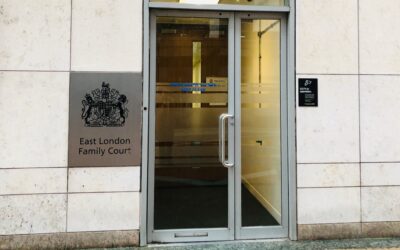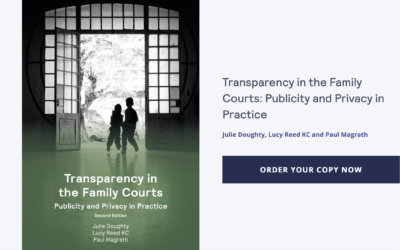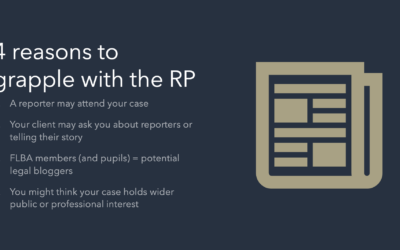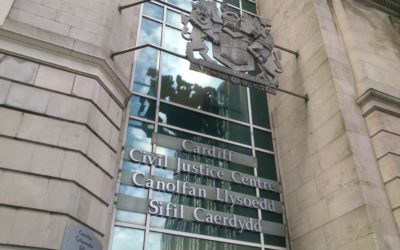Legal Blogging and the Reporting Pilots
This page contains information about the legal bloggers scheme set out in Family Procedure Rule 27.11. This page has been updated to incorporate information about the Reporting Pilots.
Under FPR 27.11, ‘duly authorised’ lawyers may attend private family court hearings on a similar basis to journalists. Rules regarding privacy and restrictions on reporting remain unchanged, though we often seek and are given permission to report on an anonymised basis, usually with the agreement of the parties.
We explain a little about the scheme and how it came about here.
Reporting pilots
There are now two pilots operating in some, but not all family courts:
The children pilot launched in Leeds, Carlisle and Cardiff in January 2023 and in those courts now covers most children cases at all judicial tiers, including Magistrates.
The children pilot launched in a number of other courts in England in January 2024. In those courts the pilot covers most public law children cases, and is expected to be rolled out to cover private law children and magistrates work later in the year. The new pilot courts are Liverpool, Manchester, W Yorks (Leeds, Bradford, Wakefield), Hull (Kingston upon Hull, Grimsby, Beverley), Nottingham, Stoke (Stoke on Trent, Stafford & Newcastle-U-Lyme Mags), Derby (& Chesterfield), Birmingham, Dorset, Truro, Luton, Guildford, Milton Keynes, Central Family Court in London, East & West London Family Courts.
Under the children pilot the usual starting point is reversed and legal bloggers and journalists will be able to report what they have seen and read without making an application for permission – as long as it is anonymised. You can read more about the Pilot here.
A Financial Remedies pilot launched in January 2024 in Leeds, Central London Family Court and Birmingham. You can find out more about that here.
Now that the pilots are up and running, legal blogging should in some respects be less daunting for lawyers to become involved in. We are encouraging more lawyers to think about undertaking legal blogging, by observing hearings and writing about them. We have run training for lawyers and potential legal bloggers, which is available here and here. If you would like to have a chat with us about legal blogging please send us a message at trustees@transparencyproject.org.uk.
Download our Legal Blogging Leaflet. We’ve made this leaflet to help explain the scheme to those whose cases bloggers want to attend. Bloggers can print and take it with them to court, to hand out as required.
Download our guidance notes – What to do if a reporter attends (or wants to attend) my hearing. We produced these guidance notes to help lawyers and judges in cases attended by legal bloggers or journalists. You might find it helpful to refer to or to signpost lawyers and judges to. We have made separate versions for pilot courts and non pilot courts.
Read our FAQs below.
FAQs
Can you attend my hearing?
We are often invited by some parties to attend their hearings. Often these requests will be from litigants who are unhappy about their case and how it has been handled, worried about how it might be handled, or who want the issues in their case to be brought to a wider audience. Our approach to these requests is as follows :
Please don’t send us court documents or lots of detail about your case in the hope we will attend court. There are strict rules about what you are allowed to share with us and we don’t want you to be criticised for sharing information that you shouldn’t have shared. The rules are slightly different in cases running under the pilots. If a transparency order has been made in a pilot case there are some documents that we are allowed to see, and the order will tell you which those are (see below).
Please do send us :
- the case number, time, date, location, length and type of hearing (and whether the hearing is remote or in person)
- no more than a paragraph outlining what the case is about and why you think we should come
- the name of the judge if known (or if not the level of judge dealing with the case e.g. Magistrates (Lay Justices), District Judge (DJ), Circuit Judge (HHJ), Recorder, High Court Judge (J)).
- the contact details for the court
- in a pilot case you can send us (or ask your lawyer to send us) certain documents identified in the Pilot Guidance (see para 36 onwards here).
What you need to know:
- If a hearing is online or hybrid we will most likely attend remotely (i.e. by video link). We rely upon volunteers and it is not always feasible for them to travel long distances to attend court.
- Whilst we will not tell the court who has invited us to the hearing (which we treat as a confidential journalistic source), it is likely that in many cases it will be obvious to the court and the other parties who has told us about the case. Whilst we don’t think that anybody should have this held against them in the case this is not something we can advise you about, and you should speak to your own lawyer before contacting us if you are worried.
- Once you contact us we will make an independent decision about whether or not to attend the hearing. Whilst we will take into account any known objection to our attendance (including if someone has invited us but then changed their mind) we might still decide that we would like to attend.
- Whilst it is helpful to be pointed in the direction of hearings that might be interesting and worthwhile for us to attend, we have a limited number of legal bloggers on our team, who often have professional commitments during the day. Our bloggers generally blog on a voluntary (unpaid) basis. It is therefore unlikely that we would have the capacity to attend a specific hearing on request, particularly at short notice.
- We are an educational charity not a campaigning group. If we attended the hearing we might take a different view of your case than you do, and we might want to speak to various people involved with different views than your own. We generally try to report on a neutral basis without taking up a position for or against one or other ‘side’. We are independent of any party or the court. Editorial decisions about the contents of our reports are a matter for us alone and not for either party (or the court) to dictate (as long as we stick to the limits of permission to report, which is usually solely concerned with ensuring the parties / children are not identified).
- Because of automatic reporting restrictions we might not be able to report anything at all about your case even if we came to court. We generally make a request for permission to report the case anonymously at the end of the hearing. In our experience so far this is often granted and these requests don’t take long to sort out, but in a contentious case things might take longer.
- Where possible we will email the court/judge in advance of the hearing to indicate our intention to attend. When we do so the court may contact you to ask for your views, or the judge may check the position at the start of the hearing. We find it helpful to be able to see the case outline, skeleton arguments or position statements that have been prepared for the particular hearing we are attending in order to understand a bit more about what we are hearing and to ensure any report we do write is accurate, so we may also ask for permission to see those documents in advance. We are generally not allowed to see them without the judge’s permission, so again, you might be asked for your view about this. Generally if we are provided with these documents it is for information only and we must keep them confidential.
- Where we do attend a hearing we will try and cause as little disruption as possible so you can get on with focusing on the case.
- We do not generally conduct interviews with the parties outside of court as some journalists might.
Who can attend?
Duly authorised lawyers fall into three categories :
- Practising lawyers
- Non practising lawyers working for a Higher Education Institution
- Non practising lawyers working for a registered educational charity whose details have been placed on a list with the President’s office. The Transparency Project is such a charity.
To attend as a ‘legal blogger’ a lawyer must be qualified, and they cannot be someone otherwise involved in the case. They must be attending for journalistic, legal education or research purposes i.e. usually with a view to writing a blog post based on their observations.
How do I identify a hearing to attend?
Whilst most private hearings can be attended under this scheme, those which are ‘conciliation’ type hearings are not covered by the scheme (though that is not to say that a judge might not agree in an individual case to permit access. Cases marked as FHDRA (First Hearing Dispute Resolution Appointment), IRH (Issues Resolution Hearing), DRA (Dispute Resolution Appointment) or FDR (Financial Dispute Resolution) are ‘conciliation’ type hearings so you are unlikely to be able to attend these hearings under the scheme.
Generally cases with a C number are care (public law children), cases with a P number are private law children, cases with a F number are injunctions (Family Law Act) and D is financial remedy (divorce).
You will need to look at the list to see how long the hearing is listed for and whether it is worth attending (for example you might not want to dip in to day four of seven, but you might identify a one day final hearing that you are able to attend throughout).
Court lists are freely accessible the day before by registering with Courtserve web service.
Remote hearings : Courtserve listings often (but not always) now contain details of who to email in order to obtain a link to a hearing. We have found that it is difficult to get a response from a generic inbox between the time the listing goes up (usually the afternoon before the hearing) and the time the hearings starts, so you may need to be persistent and combine an email with a phonecall. If you have the name of the judge and can email them directly this may be more effective.
What will I need?
To be ‘duly authorised’ you will need to attend court with :
- picture identification
- completed FP301 ‘Notice of Attendance of duly authorised lawyer’ form (one for each hearing)
- written confirmation of attendance as a non practising lawyer under cover of an HEI or educational charity
If the hearing is remote you will need to send these documents to the court by email in advance.
A lawyer who attends under PD36J cannot have any other connection to the case and must confirm that they are attending for journalistic, public legal education or research purposes.
You might find it helpful to take our information leaflet with you to hand out to those involved in the cases you want to observe.
Will you publish my blog?
Keep in touch with how the scheme is going
Even if you don’t fancy attending court and blogging yourself, you can subscribe to our weekly emails, which contain details of all posts published in the preceding week.
You can read blog posts written under the scheme here.
Can I object to a legal blogger (or journalist) coming into my hearing?
Legal Blogging Scheme Posts
Family Court Reporting Watch Roundup
Welcome to the Roundup, where we correct, clarify and comment on media reports of family court cases, explain and comment on published family court judgments and highlight other transparency news. MEDIA COVERAGE OF FAMILY LAW MATTERS The Independent (16...
Another happy ending in East London Family Court – legal blogging under the extended Reporting Pilot
Returning to East London Family Court after my first experience of legal blogging under the Reporting Pilot (recently extended to this court), I was able to see another judge at work and to witness yet another happy resolution to what had evidently been a long and...
It’s out! New edition of Transparency in the Family Courts
"The publication of this excellent book is extremely welcome," said Sir Andrew McFarlane when Transparency in the Family Courts: Publicity and Privacy in Practice, written by three of our trustees, Julie Doughty, Lucy Reed KC and Paul Magrath, was first published, in...
Happy endings in East London Family Court – legal blogging under the extended Reporting Pilot
The transparency Reporting Pilot, launched a year ago in just three courts, has recently been expanded to a further 16 courts, one of which is East London Family Court. As that court is within easy reach by public transport, I decided to investigate its potential for...
Maintenance for a disabled adult child: a case of legal blogging
Between August 2022 and June 2023, I observed, online, a number of hearings in a single case heard by His Honour Judge Shelton who is a judge in the family court in Leeds. The case was about the amount of money that the father/ex husband (James) should pay towards his...
Reporting Pilot Expansion – training video for lawyers
On Monday 29 Jan the (children) Reporting Pilot expanded to a whole host of new courts across England and Wales, and a new Financial Remedy Reporting Pilot began. Overall this will vastly increase the potential for reporters to observe and write about the work of the...
Updated Guidance – What to do if a reporter attends (or wants to attend) your hearing – Pilot and Non-Pilot Court versions
This time last year we produced a guidance note for judges and lawyers to help them navigate the relatively unfamiliar scenario of a reporter rocking up at court. That guidance note was endorsed by the Financial Remedies Court subgroup of the Transparency...
Reporting Pilot expanded across England
As anticipated, the Reporting Pilot is now being extended to more courts - another 16, as well as the existing pilot in Cardiff, Carlisle and Leeds. We have copied the Judiciary press release below. As more metropolitan courts are now included, we may well see a lot...
Legal blogging – parents’ evidence in a private law contact dispute
Attending a case under the Reporting Pilot at Cardiff court recently, two questions arose for me that might be recognised more widely in private law disputes: How does a judge manage a fair hearing where one party is represented by a barrister and the other party has...
Transcript reveals what one judge really thinks of transparency
I begin this post by saying frankly that the transcript I have just read is shocking. If I had been told what was in it, I would not have believed it. Not so much the individual errors, but the combination of so many things gone wrong in one single transcript. Before...






